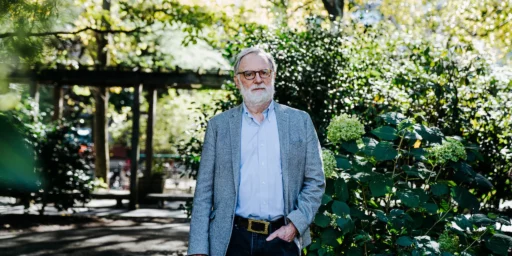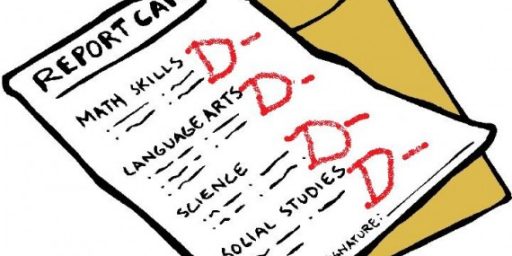Educrats Sucking Life Out of Teaching
Mikita Brottman, a lit prof and chair of the humanities program at Pacifica Graduate Institute, bemoans the rules that have sucked the life out of her syllabi — and her teaching. The course syllabus must not only contain paragraph after paragraph of legalese but be submitted months in advance.
This, I’m told, is not only to ensure that books are ordered and copyrights cleared, but also for the various documents to pass along the line of administrative staff whose job includes vetting them in order to be sure no rules have been violated, then uploading them in the appropriate format. Moreover, a syllabus, we are constantly reminded, is a binding legal document; once submitted, it must be followed to the letter. Omissions or inclusions would be legitimate grounds for student complaint.
Gone, then, are the days when I could bring my class an article from that morning’s New York Times. Now, when I stumble on a story, book or film that would fit perfectly with the course I’m currently teaching, I feel depressed, not excited. I can mention it, sure, but I can’t “use” it in the class. Nor can I reorient the course in mid-stream once I get to know the students; I can’t change a core text, for example, if I find they’ve all read it before; I can’t change the materials to meet student interests or help with difficulties, as I once did without a second thought.
This is especially perplexing in online teaching, where it’s so easy to link to a video, film clip, or audio lecture. We have an institution-wide rule that such materials may not be used unless accompanied by a written transcript for the hearing impaired. When I object that there are no hearing impaired students in my small class of six, I am told that no, there are currently no students who have disclosed such an impairment. The transcripts are needed in case any of them should do so — in which case, they would be immediately entitled to transcripts for all audio-visual material previously used in the course. Sadly, those who pay the price for this assiduous care of phantom students are the six real students in the course.
This is the high school-ification of college teaching, alas. Partly, it’s a sad but understandable response to an increasingly legalistic culture. But it’s also a function of the fact that the people who run universities these days are career educrats rather than classroom veterans who’ve been promoted up the department chair-dean-provost route. These people have “degrees” in Higher Ed Administration or somesuch and have the mindset of bean counters everywhere.






Combined with politically biased, politically correct, morally relativistic, grievance promoting faculty, I would say our bastions of higher learning may go the route of the main stream media. Higher education will take to the internet so open minds won’t have to be polluted by bombastic, egotistical malcontents left over from the 60’s.
James, I hope your generation, along with Steven and others remedies the appalling downfall of intellectual integrity in higher education.
I can’t speak to the college situation, but at the primary level education is being damaged at least as much by conservative ideology.
It’s conservatives who are attacking the teaching of science, conservatives who’ve turned primary schools into test-mills, and conservatives who seem to revel in cutting arts and music and other creative elements out of education in pursuit of some back-to-basics mythology.
I hate to break it to all you right-brain, engineering and numbers types, but while American manufacturing slips and American financial wizardry has been revealed as a costly scam, we over in the airy-fairy creative fields are pumping out billions in high-profit exports. If there is a single segment of the world economy where Americans hold an uncontested first place, and have for decades, and look to continue holding for decades more, it’s the creative fields: movies, TV, music, fashion, art and all forms of writing. The world laughs at our cars and lines up around the block for our movies.
The official syllabi required by our eCampus educrats is something like 10 pages in length (making them worthless as syllabi and instead more like mini-versions of the student handbook). I end up using an abbreviated version as well so that students can see all the of the relevant stuff for my class.
And technically there is a standard syallabus for all on-campus general studies courses as well. Thankfully (to date) the educratic impulse to attempt to control upper division and graduate courses on campus has yet to win out.
But yes: there is waaay too much “educational leadership” stuff influencing high ed.
Michael, there was a time when our best creative types were all drop-outs(*). Has that changed? And if so, is the degree what made them creative or did it just stall them?
* – on the “right-brain, engineering and numbers” side the top-scorer, richest man, is actually a “just do it” drop-out as well.
Greetings:
Back when I was studying business things, I came across something called Parkinson’s Law which averred that “Work expands to fill available staff and space.”
John:
I’d never go so far as to say “most.” But a lot.
I have long suspected — based in part on personal experience, and now on watching my 12 year-old son in school – that schools make it all but impossible for “creatives.” Schools actively attack creativity like antibodies going after a flu virus.
That attack comes equally from Left and Right, since the Left despises anything that smacks of a non-level playing field (talent), and the Right despises anything that might cause a student to experience joy.